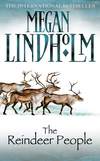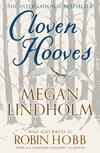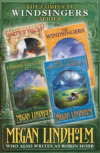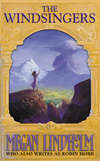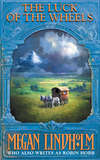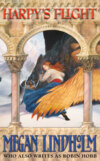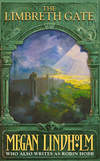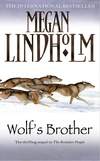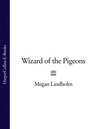Buch lesen: «The Reindeer People»
The Reindeer People
Megan Lindholm
Part One of a two-book sequence

Copyright
Voyager
An Imprint of HarperCollinsPublishers Ltd. 1 Lodnon Bridge Street London SE1 9GF
First published in Great Britain by Unwin Paperbacks, an imprint of Unwin Hyman Ltd 1989
Copyright © Megan Lindholm Ogden 1988
Megan Lindholm asserts the moral right to be identified as the author of this work
All rights reserved under International and Pan-American Copyright Conventions. By payment of the required fees, you have been granted the non-exclusive, non-transferable right to access and read the text of this e-book on screen. No part of this text may be reproduced, transmitted, downloaded, decompiled, reverse engineered, or stored in or introduced into any information storage and retrieval system, in any form or by any means, whether electronic or mechanical, now known or hereinafter invented, without the express written permission of HarperCollins e-books
HarperCollinsPublishers has made every reasonable effort to ensure that any picture content and written content in this ebook has been included or removed in accordance with the contractual and technological constraints in operation at the time of publication
Source ISBN: 9780007114221
Ebook Edition © SEPTEMBER 2011 ISBN: 9780007394012
Version: 2016-08-18
Table of Contents
Cover Page
Title Page
Copyright
KERLEW: THE SMOKE
CHAPTER ONE
CHAPTER TWO
CHAPTER THREE
CHAPTER FOUR
CHAPTER FIVE
CHAPTER SIX
CHAPTER SEVEN
CHAPTER EIGHT
KERLEW: THE POUCH
CHAPTER NINE
CHAPTER TEN
CHAPTER ELEVEN
CHAPTER TWELVE
CHAPTER THIRTEEN
CHAPTER FOURTEEN
CHAPTER FIFTEEN
KERLEW: THE NIGHT
CHAPTER SIXTEEN
CHAPTER SEVENTEEN
CHAPTER EIGHTEEN
CHAPTER NINETEEN
KERLEW: THE SEEING
Keep Reading
About the Author
By the Same Author
About the Publisher
KERLEW: THE SMOKE
‘Go deep,’ he told the boy. ‘Follow the little brown mouse when she takes her seeds and hides from the winter. Go to where the water bubbles up in a spring, and dive into its secret source. Follow the roots of the grandfather spruce down deep into the soil and beyond. This I tell you, for while every shaman must find his own entrance, these are ones that are known to have worked for some. Not all, but some. They are worth trying.’
Kerlew swallowed and tried to keep his drifting eyes on the old man’s face. But Carp added another pinch of herbs to the lamp flame, renewing the wavering curtain of smoke between them. ‘What do I seek?’ Kerlew asked with difficulty.
Carp’s tone was patient. ‘I have told you. You seek for a magic, and a brother. Find a path into the spirit world and it will lead you to a deep room. The walls are of stone, and water drips down them. Roots hang from the ceiling. You must go through this room and out, into the spirit world. Do not speak to anyone in the stone room, not even if he calls you brother and offers you many fine gifts. For if you speak, you must remain there, and he will be free to take your place. Thus are many shamans trapped. I myself have seen them as I passed on my way to the spirit world. Don’t speak to them!’
‘I’m afraid,’ the boy said suddenly.
The old man only shook his head, softening the gesture with a smile. ‘You will go past those ones, and out into the spirit world. I cannot tell you what to expect, because for each shaman it is different. But when you meet your spirit guardian, you will know him. He may choose to test you. He may show you his teeth, or trample you beneath his hooves. He may rend you with his claws, or seize you in his talons and carry you up into the sky. Whatever he does, show no fear. Be bold, and set your palm between his eyes. Then he will be your brother, and he must give you a song or a magic to bring back with you. But if you cry out or flee or strive to hurt him, he will not be your brother. He will kill your spirit, and your body will waste away after you.’
Kerlew clenched his fists to keep his hands from trembling.
Carp saw, and for an instant the sternness of the instructor left his face. He looked down on his apprentice fondly. ‘It will be all right,’ the old man said kindly. ‘Go ahead, now. Don’t be afraid.’ He touched the boy’s cheek with his weathered old hand, dragged his fingertips across Kerlew’s lined brow to soothe away the worry wrinkles. ‘You will be a great shaman, and all will point and tell tales about Carp’s apprentice.’
The boy gave a brief nod and tried to swallow the anxiety that started in his stomach but kept trying to squeeze up his throat. Old Carp smiled at him reassuringly, his pride and belief lighting his seamed old face. His teeth were yellow, separated by black and empty gaps. Kerlew thought his eyes must have been brown once. Now they were skimmed with gray film that reminded him of the green slime that clouded the surface of summer ponds. Kerlew knew that if one stirred the slime with a stick, the depths and wonders of the pond beneath it were revealed. Sometimes when he stared at Carp’s clouded eyes, he thought he glimpsed the depths and wonders beyond the gray that misted them. Gray as the smoke that drifted and wandered through the tent. When he breathed it in, it was like breathing cobwebs. It clung to the inside of his nose and lined his throat with dryness.
Carp’s withered lips were moving, and Kerlew focused on them with difficulty. He was supposed to be listening, he remembered belatedly. The smoke was supposed to make this easier. Instead it was making it harder.
‘Just breathe deeply and listen to the drum. Let the drum guide you. Listen now.’
The drum. Kerlew shifted his eyes to Carp’s hands. A little drum with a yellow-leather drumhead was gripped between the old man’s knees. In one of Carp’s hands was a tiny hammer, made from a bear’s molar mounted on a stem of birch. Kerlew watched the molar lift and fall, lift and fall, lift and fall. Each time it struck the taut leather it made a sound. Listen to it. He was supposed to listen to it. The old shaman’s fingers were the same color as leather that had been used a lot and hung up inside a smoky tent. Like this smoky tent. His eyes drifted away from the drum and fingers, rose to follow the gray smoke as it swirled silently through the tent.
Carp was still talking to him. His words drifted through the tent with the smoke. ‘Listen to the drum and let go of this world. Breathe in in this world, breathe out in the spirit world. Let go and go down, into the spirit world to seek out your spirit beast. Go down, follow a mouse, follow a beetle, go down into the spirit world, followatrickleofwatergodown-deepintotheearth…’
The words mingled with the smoke and swirled through the tent and up. Up and around, past the patch sewn on the tent wall, past his leggings hung to dry on one of the tent supports, past the old shaman’s head. Kerlew lay still on his pallet of hides and watched them. His tongue was gummed to the roof of his mouth and he could not let out his breath. He could take in air, and he felt his chest swell tighter with every breath. But he couldn’t let the air out. For a slow moment he noticed this and it troubled him. Then his attention was caught once more by the swirling smoke. He watched it glide, so gray and soft and free. He let out a long sigh and followed the smoke.
Once he had fallen into a river, and before his mother could snatch him out, he had been washed downstream on the buffeting flood. This was like that time, except the smoke was warm and soft and there were no great stones to batter him. It carried him up and around, toward the peak of the tent and the smoke hole. He brushed past the old shaman’s bent head, heard a few lingering notes from the skin drum. For that instant he remembered that he was supposed to be going down, into the earth to seek the depths of the spirit world. Then he swirled past Carp and was carried aloft on the smoke. The old shaman’s instructions no longer seemed important. He floated up and out of the smoke hole.
The night was black, studded with stars. Winter was but a breath away, yet Kerlew did not feel the cold. He hunted across the sky, the smoke soft beneath him, his every stride a stag’s leap. Then, as he felt the smoke grow thinner and fade, he began to step from star to star just as one could step from stone to stone in a stream crossing, or from hummock to hummock in a bog. Gone was his usual clumsiness and halting stride. Here he walked as a hunter and a man. The night wind touched his hair.
Higher and higher into the sky he climbed, until far ahead of him he saw the pale hides of the moon’s caribou. Far above the stars behind the moon, the herd was scattered out across the black sky. Kerlew stood on the highest stars and lusted after them. Their coats shone like lake ice and their antlers swept white and gleaming over their backs. Their heads were down and they grazed across the night sky. He knew that the smoke of their breath formed the clouds, and the clash of their antlers presaged thunder and lightning. Their power and majesty made his heart ache. He knew that if he touched one between the eyes and claimed it as his spirit brother, he would be a powerful shaman indeed.
But between him and the herd the stars were few and widely scattered. He stood teetering atop two stars, yearning after the sky caribou, and wondering what he should do. Briefly he recalled that Carp had told him to go down into the earth, not up into the sky. With a sinking heart, he knew he had disobeyed his master; he would fail in his hunt. He would return from this journey, no shaman, but only the healer’s strange boy. At the thought, sickness washed through his belly and throat and tears nearly blinded him. He forced a shuddering breath into his lungs. Unless, perhaps, he could claim one of these creatures as his spirit brother…He centered his courage in his belly and prepared to jump to the next star.
But from behind him came the sound of panting, and he felt hot breath on the backs of his legs. Turning, he beheld Wolf racing up the stars toward him. Wolf’s coat was gray streaked with black, and his lolling tongue was red while his eyes glowed green. His great paws splayed wide with every stride he took, and Kerlew noticed every black nail. Then his eyes met Wolf’s, and in that moment he knew his brother.
He set his feet well and lifted his hand. Palm out he waited for Wolf, and when he was but a few stars away, Kerlew cried out, ‘I claim you as my spirit brother.’
Wolf didn’t pause but laughed savagely as only the wolves can. ‘Fool!’ he howled. ‘You cannot claim me here!’ With a sudden leap he sprang high over Kerlew’s head, beyond the reach of his outstretched hand. To the next star and to the next he sprang. The great white herd of sky caribou suddenly marked his coming. They threw up their antlered heads and bellowed to one another in fear. As one creature, the whole herd leaped into flight, bounding away across the night sky with Wolf panting behind them.
All this Kerlew saw in a teetering instant. The winds of Wolf’s passage swept his balance away. His arms flapped vainly as he tried to keep his precarious perch, and then he was falling, tumbling down between the stars that snagged and caught at him like brambles. The bright light of the moon faded into a mellow darkness as he fell, and to his ears came the far sound of Wolf’s hunting cry. Kerlew knew he called to his brothers, and he snatched at the words as they whispered past his ears.
‘If you would be Wolf’s brother, learn to follow the herds!’
CHAPTER ONE
The birthing had been long, though not as difficult as Tillu had feared. Elna’s thick hair was sweat-soaked to her skull; in the heaviest of her labors, she had thrown aside furs and skins, panting with the heat of her struggle. But soon after the child emerged, she was shivering with cold and asking that her pallet be moved closer to the fire. The young mother slept now, her fat babe nestled in the crook of her arm, soft furs tucked closely around them both. Elna had been so proud when she saw her baby, her cry of joy louder than her cries of effort had been. He was the first child for Elna, and a large one. Tillu had feared that in her inexperience the laboring woman would push too hard and tear herself. But all had gone well.
She spread one more covering of soft fox furs over mother and child and bent to gather the bloody scraps of hide the newborn had been cleansed with. Tillu straightened slowly, wishing she could just lie down and sleep. Her back ached from her hours of kneeling and crouching by Elna, and her head ached from the tension of midwifing. The need for a successful birthing had been like a knife at her spine. The other women were gone now, but during the birth, they had crowded inside the tent. Tillu had felt their eyes on her like clinging burrs. Had they believed she would do Elna some ill? She supposed so. She sighed again and rubbed at her weary eyes. A fine healthy boy, she reminded herself, resolved not to let her thoughts drag her down again. She was past that, now. She was going to be accepted again.
Outside the skin tent, Rak sat by a blazing fire, eating boiled meat the other women had prepared for him. On the opposite side of the fire, Benu’s hunters shared his vigil. All were dressed for hunting; all looked toward the new father. He gripped his best bone-headed spear, its butt grounded against the frozen earth. His deep voice obscured the crackling of the fire, carrying his proud complaints through the leather walls of the tent. ‘No doubt that useless woman of mine has birthed a puny, whimpering babe no bigger than a squirrel. Such is my luck. She is too young and foolish to bear a child.’
‘Foolish man!’ chided one of the passing women daringly. Her voice carried clearly through the cold night, meant to be overheard by all. ‘Your firstborn is so large a child, doubtless your wife will have all she can do to pack him about and tend him, let alone see to your needs!’ The laughter of the other women of Benu’s band swept the night.
‘He will fill her arms and bend her back,’ crowed another.
‘To sew a shirt for such a babe will be the work of a day and a night, while you, poor man, will go naked in the wind, and spend every moment hunting meat enough to fill him!’
‘Bold ones!’ chided one of the men. ‘Dare you speak to a man so? Get back to your own fire!’
But the shouts of laughter that greeted her daring compliment belied the rebuking words. Such tribute made the young father flush even darker with pride. Meanwhile the rejoicing women were cooking delicacies for him, fresh tender tongues and fat ribs simmering in their own rich broth. The tempting odors penetrated the tent, making Tillu aware of her own hunger. She did not need to peer out to know what went on. The young man basked in the honor due one whose wife had just increased the strength of the hunting band. The men of Benu’s folk paid their silent respects with the items they dropped unmentioned at the young father’s feet. Sinews for bowstrings and bone arrowheads; fit gifts for a firstborn son. Had it been a daughter, it would have been the women who would have casually ‘lost’ bone needles and hide scrapers beside the mother’s pallet. Such gifts were never mentioned by giver or receiver but were quietly set aside and cherished until the child was of an age to use them. Any birth was a cause for celebration, but tonight the small band of hunters rejoiced as if this were the first babe ever born. After their losses this summer, they needed the comfort of new life, even a babe born this close to the fangs of winter.
She glanced about the tidied tent and poked at the wick of the stone lamp to shrink its flame. Her duties were done here. Tillu scratched away a flake of dried blood on her wrist, thinking. The other women of Benu’s folk had already borne away the afterbirth, to set it out on an altar of five stacked stones. Tomorrow, Carp would study the signs of the animals that had visited it during the night, and then would announce the child’s guardian spirit. Tomorrow would be Carp’s day, to shake his rattles of leather and bone and speak in strange voices. Tomorrow Carp would be very busy, receiving the honor due him as a shaman. All the folk would be caught up in celebrating the birth of a new hunter. Tonight would be a good night to leave.
The decision surprised her. She tried to reconsider it as she lifted the tent flap and peered out into the night. The world balanced on the knife edge between autumn and winter. Only a fool would leave the safety of a tribe at this time of year. The tiny tent village around her was as much civilization as this part of the world knew. Beyond the temporary bounds of this hastily pitched camp was the forest. She knew the forest was not eternal; a lifetime away, to the south and east she thought, was a land of farmers and cultivated fields, of riders of horses and reapers of grain. It was the land of her childhood. But this was the reality of her adulthood: this northern forest, and the small bands of semi-civilized people who inhabited it. From group to group she had wandered; this was the farthest north she had ever been, and Benu’s folk the poorest of any she had lived with. Of bones and stones, hides and meat were their lives wrought. She pulled her wolf hood up and forward to shelter her face from the early winds of winter as she left the humid warmth of the skin tent.
The blazing light of the fire against the stark blackness of the night blinded her. The men had built it high, fueling it with branches both green and dry, and sometimes splashing precious oil on it to make the flames roar wildly. The dancing flames cast strange shadows that made the surrounding trees seem to writhe in the unexpected warmth. Close to the fire, the men feasted on the boiled ribs and juicy tongues, their faces shining with heat and grease and joy at the new hunter’s birth. Tillu walked past them silently, her soft boots crunching frozen moss and grass underfoot. None of the men deigned to notice her passage. It was unworthy of hunters to pay attention to a woman and a midwife.
For a moment the night held her closer. It was a clear night of black skies and the stars were as thick as yellow pollen on a quiet pond. The camp had been made in a small vale between two hills, a place protected from most of winter’s wind. The forest in this area was an open one, of paper birch and alder and willows that merged with brushy thickets and then bog grasses. Years ago this area had been burned over. Fire-blackened stumps and scarred giants of trees were reminders of that time, but most of the live trees were no bigger than she could span with her two hands. It was fine hunting for small game and browsing deer, and Benu’s folk had summered well in the winding river valley. But the sparse leaves that now clung to the branches were gold on the birch, dirty yellow on the willow and red on the alder. The edges of the coarse grasses and fallen leaves that carpeted the ground were outlined tonight with shining silver frost. It was time for Benu’s folk to seek out the older forest of spruce and pine that offered more shelter from winter’s blasts. There they would cope and struggle through until spring. So Tillu knew from their talk. She had once thought she would go with them. Now she shivered and pulled her arms inside the loose sleeves of her coat to hug her body.
At a proper distance from the birth tent and the men, the women clustered together about their own, smaller fire, discussing every detail of the birth, and arguing as to whether the child was as large as Ardee’s firstborn had been, or even larger. They were eating dried egg yolks, passing a sack made of deer intestine, each squeezing up a mouthful of the sticky, rich yolk and biting it off before passing it to her neighbor. Their hoods were pushed back in the heat of their fire. Their sleek black-haired heads showed glints of blue as they nodded to one another, and they muffled their giggling behind small browned hands so as not to annoy their menfolk. The joy of this small band of humans at now being eighteen instead of seventeen folk was a warm and tangible glow in the night.
Tillu could have gone to join the women at the fire. On this night, at least, she would have been welcome to share their yolk-sack and to chatter with them of babies and births she had presided over. She would be but the Healer and Midwife, just another woman at the fire. No one would mention the events of the summer. No one would speak of her son, Kerlew.
Tillu turned away from the small fire and the congenial women. She was too tired, she told herself. That was all. And her decision, sudden as it had been, was still strong. She was going tonight, and that would take some preparation. Besides, she was hungry for more than the rich stickiness of egg yolk. Her midwife gift would be in her own tent, borne there by the women as soon as the child’s cord had been safely bitten. The father would know nothing of it. Among Benu’s folk, birthing and midwives were the province of the women, and for a man to stoop to being interested in such things would be strange indeed. And dangerous, for spirits had been known to become offended at those who did not keep to their proper roles. The child was still especially vulnerable until Carp announced his guardian spirit tomorrow. Thus the huge fire that burned before the birth tent, and the father’s brave vigil through the night. The spirits could be jealous and vengeful to those who flaunted their will.
Like Tillu.
She pushed the thought away. She had not been brought up to believe in such spirits as populated every cranny of these hunters’ world. She would not be cowed by them now. Had she lived so long among wandering hunters as to share their childish fears? Then it was time to move on. Somewhere there were other folk who would welcome a healer and midwife, people who knew more than skin tents and tools of bone. She squared her narrow shoulders against the night fears she would not admit and hurried through the darkness and clustering trees to the isolation of her small tent.
Yellow lamp light escaped from the ventilation flap and seams to welcome her. She would have to scold Kerlew for letting the lamp burn so brightly and use so much oil. But if he had been talking to Carp, as he did too often now, he would tell her that the tending of a lamp was woman’s business, and not for him to worry about. She sighed a tiny sigh. It was not that Kerlew was harder to live with these days; it was just that she had been accustomed to his old differences and difficulties. These new ones were heavier to bear.
She lifted the tent flap, grateful for the light and heat that flowed out to greet her. It was good to be in her own tent again. She became aware anew of the tension that energized her whenever she had to move among Benu’s folk. Uneasiness, she tried to tell herself. Not fear. But only when she was alone with her son did she feel safe from their accusing eyes. Only when she could actually see Kerlew did she stop worrying about him, lest some small but deadly accident befall him. She threw back her hood as she entered the shelter, ready to relax. The sight that greeted her stiffened her weary muscles.
The dished stone of the lamp was heaped with lumps of melting tallow. The twisted moss wick that drew up the melting fat smoked and flared dangerously high. The gift of food left for her by the other women had been reduced to scattered fragments beside the blazing lamp. The old shaman was licking gravy from the side of his hand as she entered. He gave her a gap-toothed grin. His face was like wrinkled leather dried after a rainstorm. The smell of his magic clung to him like the stench of carrion to a bear’s hide. When he stood staring at her as he did now, bandy legs spread wide and head nodding, her aversion to him was like a physical thrust. She wanted to strike him, to drive him from her territory. She suspected he sensed it. Sensed it and enjoyed it. So she ground her teeth but forced herself to keep the custom of Benu’s folk. Carp was the shaman. No one could begrudge him anything. And no woman denied any man a share of the food in her tent lest she insult her own husband by implying he was too poor a provider to feed a guest. The fact that Tillu had no husband made no difference at all. Guests were always to be honored with food, to be pressed to eat and enjoy, while the host always bemoaned the fact that what he could offer was so unworthy. Then the honored guest would protest that the food was of the finest quality, much better than anything his own poor household could provide. And the next night, the guest would be the host, and the roles would be exchanged. Unless the guest were the shaman. Then the host knew that the spirits were pleased by his fine treatment of their friend, and would bless the household. Was not that honor enough? So Tillu chewed and swallowed her outrage. For the last time, she promised herself.
‘This one is honored that you would be so kind as to share the small and stale provisions of my tent,’ Tillu greeted him formally.
Carp belched politely and rubbed his belly to show the extent of his satiation. ‘Your home has been generous to me.’ His eyes followed Tillu as she bent and pulled her reindeer coat off over her head. She sat on her pallet to draw off her knee boots of fox fur soled with winter-taken deer hide. She pulled out the felt padding made by drying and pounding the tough supple stalks of sedge grass and put it by the lamp to dry. She stood barefoot on the cold packed-earth floor. The shaman stared. She was so different from the short stocky women of Benu’s folk. She was small, as short as they, but to look at her was to see her as a smaller, fine-boned specimen of a larger people. From elbow to wrist and knee to ankle, her long bones were proportionately longer than those of the women Carp knew. The difference made her unattractively thinner in his eyes. Her hair was finer, more brown than black, as were her eyes. The color of her skin was subtly warmer, as was her temperament. But Carp was willing to overlook these flaws, for she was strong and healthy, and almost young. Besides, women were scarce among Benu’s folk, and mostly taken. She would do.
Tillu avoided his gaze but could feel his thoughts. When she had first joined Benu’s folk, he had been more subtle. But Tillu had resolutely ignored his courting gifts and the unsubtle hints from Benu’s wives. She had no desire to be the shaman’s woman. No man had owned her since Kerlew’s father had left her, heavy with the child. She had not missed belonging to a man. Yet, among Benu’s folk, a woman without a man to rule her was but half a being. Women had their fathers, their husbands, then their sons to order their lives and protect them. At first the other women had pitied Tillu, alone in the world. But as time passed, she had become an uneasiness among folk. Could the spirits be pleased with such a creature as she? By their traditions, Carp could not force her, though she knew that if she stayed much longer with this group, the social pressure could become unbearable. Then, if Carp did take her against her will, no one would intervene, but would say that the shaman knew the desires of her spirit guardian better than she did herself.
At the thought, Tillu clenched her teeth. It would never come to that; she was leaving this night. She could afford to be civil, for one last time. She drew a silent breath. ‘And my son?’ she asked courteously. ‘Has he shown you the respects of our home?’
Carp rubbed grease from his chin. ‘The man of this tent has been most gracious to me.’ He inclined his head respectfully toward the pallet at the back of the crowded tent where Kerlew reclined. The shaman’s dark old eyes, flawed by gray clouds, voiced a silent challenge. Tillu took a step nearer her son.
Kerlew lay on his side, staring up at the shadows on the slanting wall of the tent. He wore only his breechclout of yellowed leather. His coarse black hair was unbound and cascaded about his face and shoulders. His gaze was empty, wandering. For an instant, she could almost see him as strangers did, as a boy rather than as her son. His face always attracted stares. His hazel eyes were very deeply set on either side of the narrow bridge of his nose. The closeness of his eyes to one another made his passing glance seem a peering and his stare an unbearable intrusion. More than one adult had cuffed him for that seeming rudeness. His lips were full and his prognathous jaw emphasized this. Small ears were flattened tightly to his large head, nearly hidden by his hair. His narrow hands waved gracelessly in the air, and he stared, entranced, at their shadows as they flowed and danced on the hide wall. At rest, his fingers curled in toward his wrists, and the thumb stayed in close to the fingers. It gave his hands a blunt and helpless look. But now they flapped at the ends of his arms, and their shadows mimicked them. As he dreamed, his mouth moved silently, speaking, and then laughed gutturally at some pretended reply. Anyone else would have assumed that he was feverish and wandering, or in a shamanic trance.
